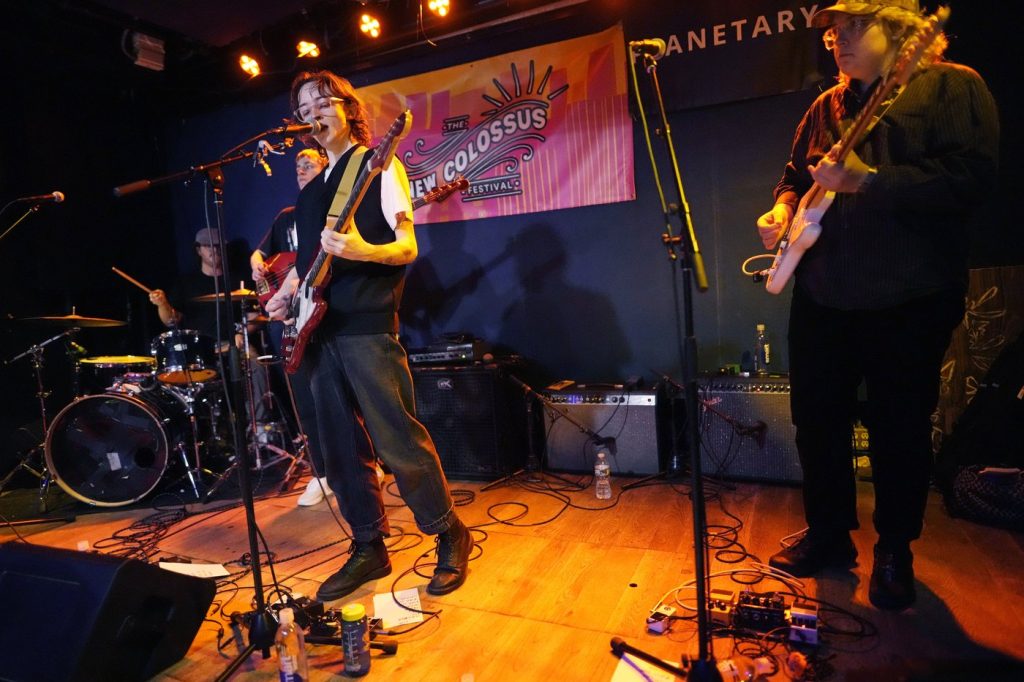NEW YORK (AP) — The New Colossus Festival in New York City recently showcased a diverse lineup of international artists, with a schedule that featured 196 performers, over half of whom hailed from outside the United States. The six-day festival, named after a famous poem inscribed on the Statue of Liberty, opened with performances by a Japanese rock band, a German post-punk trio, and an alternative group from New Zealand, highlighting its global appeal.
However, the experience of international artists trying to perform in the U.S. has become increasingly complicated and costly. Mischa Dempsey, the frontperson for the Montreal band Knitting, described the process of obtaining the necessary visas as “labor intensive” and noted that it’s at its “maximum level of difficulty” as they navigate the complex immigration system.
As of April 1, 2024, the U.S. Citizenship and Immigration Services (USCIS) implemented a significant increase in visa fees, raising the cost from $460 to over $1,615 per musician application—the first increase since 2016. This change was intended to help the USCIS recover operating costs and improve processing times, yet reports indicate that delays have actually worsened, according to immigration attorney Gabriel Castro.
Complications have arisen from changes to visa petition processes; all applications are now centralized in a Texas service center and then randomly assigned to processing centers in California and Vermont. Processing times have tripled in Vermont and doubled in California, creating challenges for artists who typically cannot plan tours far in advance. The expensive option to expedite processing adds additional financial strain, particularly for small and mid-tier artists who cannot afford the nearly $3,000 fee.
Concerns over the viability of touring in the U.S. have led some international artists to reconsider their plans. The K-pop group KARD, the Canadian metal band Respire, and Swedish rapper Bladee are among those who have canceled or delayed U.S. tours due to visa complications. This trend has raised questions about the economic viability of touring in the United States for these artists, especially when booking dates must precede visa applications.
World music, jazz, and indie bands, especially those outside of Europe without government support, are disproportionately affected by the visa fee hikes and processing delays. Festivals like New Colossus rely on participating artists who often receive funding from their respective countries to cover these costs. Despite this support, several artists faced last-minute cancellations due to visa issues, highlighting the unpredictability that governs international performances in the U.S.
There are broader implications of these immigration hurdles beyond the realm of music. The loss of international talent impacts local venues and the economies surrounding them. As coalition-building efforts in the music industry grow, many are expressing concern that the current political climate may exacerbate these issues. The last Trump administration witnessed growing difficulties with the consular process, a trend that could resurface with the new administration, further complicating visa procurements.
With the evolving landscape, artists, especially those who may face scrutiny or discrimination based on their identity, are apprehensive about their ability to travel to the U.S. and perform. Dempsey from Knitting voiced concerns that political agendas could influence visa approvals, raising fears for nonconforming artists entering the country.
The combination of escalating costs, extensive delays, and an increasingly scrutinized immigration process paints a challenging picture for international artists wishing to make their mark in the U.S. As many ponder the feasibility of future tours, the importance of creating a welcoming environment for artists and their artistry becomes ever more crucial for the continued vibrancy of the U.S. music scene.











